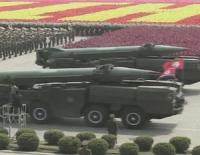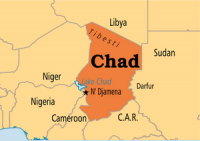-
For $1000, anyone can purchase mobile advertising to track your location, app use
Privacy concerns have long swirled around how much information online advertising networks collect about people’s browsing, buying and social media habits — typically to sell you something. But could someone use mobile advertising to learn where you go for coffee? Could a burglar establish a sham company and send ads to your phone to learn when you leave the house? Could a suspicious employer see whether you’re using shopping apps on work time? The answer is yes, at least in theory.
-
-
Why are Russian media outlets hyping the Mueller investigation?
Four major Russia investigations are underway in Washington, along with at least six related federal inquiries. Russia’s most popular media outlets compare the investigations to those of the McCarthy era, calling them “witch hunts” focused on a “phantom menace.” Amid all the emphasis of “Russophobia run wild,” however, Russian media coverage seems to have become more positive in regard to one issue: The Justice Department’s investigation led by Special Prosecutor Robert Mueller. While state-sponsored outlets continue to deny any possible collusion between the Trump campaign and the Kremlin, they’ve begun to applaud Mueller’s efforts to look into the past business deals of the U.S. president and his team. In affirming the U.S. investigation into Trump’s business practices, Kremlin strategists can co-opt the charges of Putin’s critics and direct them at Trump. They can argue that the U.S. is neither more virtuous than Russia nor more efficacious. And they can do so without having to acknowledge that a Mueller-style investigation into top-level government malfeasance would never be allowed in their own country today.
-
-
Russia used Pokemon Go "to sow division” in run-up to 2016 presidential election
CNN broke the news yesterday that Russian government hackers did not only use Facebook, Twitter, and Google platforms for a broad, systematic, and sophisticated disinformation campaign in the run-up to the 2016 election – they also used the popular video game Pokemon Go. The game was used to promote a Black Lives Matter-like message about police brutality, aiming to discourage African American voters from going to the polls, while creating a White backlash against those criticizing the police.
-
-
U.S. bans Russian anti-virus software after Israel warns about hacking
The U.S. government recently prohibited federal agencies from using the products of the Russian cybersecurity firm Kaspersky Lab. Kaspersky’s anti-virus software is used by 400 million people globally – and the off-the-shelf software was installed on many U.S. government systems. Israeli intelligence officials warned their U.S. counterparts that Russian government hackers had morphed Kaspersky’s anti-virus software into a search engine for sensitive information. The classified data was then extracted back to Russian intelligence systems. Kaspersky’s denials notwithstanding, cyber experts say it is not technically possible that Kaspersky Lab’s officials were ignorant of the Russian government’s use of the company product.
-
-
Noncompliance hobbles comprehensive background check policy for private-party gun sales: Study
Of the three states that recently expanded comprehensive background check (CBC) policies to include all gun transfers, including those among private parties, only Delaware showed an overall increase in firearm background checks. Washington and Colorado had no changes, which the study authors say suggests that compliance and enforcement were incomplete. “The overwhelming majority of all firearms used for criminal purposes, some 80 percent, are acquired through private party transactions,” said one researcher. “By expanding background checks to include private-party transfers, there is a higher chance that these policies will make it harder for felons and other prohibited persons to acquire firearms and commit violent crimes.”
-
-
Could we reverse a hacked presidential election?
What would happen if we discover that Russians hacked into the results of the 2016 presidential election and tipped the outcome in favor of Donald Trump — literally changed the vote totals? “It is cold comfort that we have no evidence so far that Moscow actually manipulated vote tallies to change the election’s outcome,” the authors write. But what if it emerges that Russian operatives were successful on that front as well? Setting Trump aside, what if a foreign government succeeds in the future in electing an American president through active vote manipulation? The Constitution offers no clear way to remedy such a disaster.
-
-
Wildfires create much more pollution than previously thought

Naturally burning timber and brush launch what are called fine particles into the air at a rate three times as high as levels officially noted in emissions inventories at the U.S. Environmental Protection Agency, according to a new study. This does not mean that burning biomass produces more pollution than it previously did, but the new research makes clearer how much and what pollutants are inside a wildfire plume. Fine particles, the microscopic, sooty specks that form aerosols, are a hazard to human health, particularly to the lungs and heart.
-
-
U.S. voting machines can be easily, quickly hacked: DEFCON report
DEFCON yesterday released its much-anticipated report, detailing findings from its first-ever “Voting Machine Hacking Village.” The Voting Village was held three months ago at DEFCON25 in Las Vegas. The report highlighted how every piece of equipment in the Village – which included voting machines and poll books still largely in use in current U.S. elections – was effectively breached in a matter of minutes by hackers. “What the report shows is that if relative rookies can hack a voting system so quickly, it is difficult to deny that a nefarious actor – like Russia – with unlimited time and resources, could not do much greater damage,” said Voting Village organizer and University of Chicago cybersecurity instructor, Jake Braun. “That threat becomes ever more poignant when you consider they could hack an entire line of voting machines, remotely and all at once via the supply chain.”
-
-
Russia already moving to the next cyber incursion in U.S.

“From a technological point of view, this [hacking U.S. voting machines] is something that is clearly doable,” said Sherri Ramsay, the former director of the federal Central Security Service Threat Operations Center, which handles cyber threats for the military and the National Security Agency. “For us to turn a blind eye to this, I think that would be very irresponsible on our part.” Cybersecurity experts are increasingly concerned that Russia and others are already moving to the next incursion. “What really concerns me is having suffered these probing attacks last year, we may be in for an even more sophisticated, more potentially effective assault next time around—and oh, by the way, others were watching,” said Ambassador Doug Lute, a retired Army lieutenant general who served as the permanent representative to NATO from 2013 to 2017.
-
-
Kaspersky antivirus hack a wake-up call for business
Russian state-sponsored hackers were able to steal National Security Agency (NSA) material on methods the NSA uses to conduct cyber espionage as well as how the agency helps defend critical U.S. government networks. An NSA contractor placed the material on his or her private computer – a violation of the agency’s security policy – and the private computer reportedly had anti-virus software belonging Moscow-based Kaspersky Lab installed. The software detected the unsecured classified material and alerted Russian intelligence to its presence. Michael Sulmeyer, the director of the Belfer Center’s Cyber Security Project at Harvard University, says geopolitics should guide some in the private sector to follow the U.S. government’s lead in removing Kaspersky’s software from their networks.
-
-
“North Korea crisis could spark a global chain of nuclear strikes”: Luxembourg Forum

Leading international experts on nuclear non-proliferation and world leaders met Monday in Paris for the International Luxembourg Forum on Preventing Nuclear Catastrophe to express their concern on the escalating crisis in nuclear weapons control. During his opening remarks, Tony Blair warned that “the proliferation of nuclear weapons is the most serious threat today to the fate of humankind.” Blair further said that “Proliferation begets further proliferation leading to risk of additional terrorist capability.”
-
-
U.S. not prepared to identify perpetrators of biological attacks: Expert panel
When violent attackers use biological agents to inflict harm, not only must law enforcement attribute the crime to the correct perpetrator, they must also identify the pathogens used and their sources exactly and quickly. That was the focus of a special meeting last week hosted by the Blue Ribbon Study Panel on Biodefense.
-
-
Why would the Trump administration ban travel from Chad?

To the surprise of many experts, the Trump administration’s revised travel ban removed Sudan – but added Chad, a Muslim majority country in the Sahel region of Africa. Chad’s inclusion has befuddled observers as well as the Chadian government and the African Union. Based on my experience working at the State Department, including a period of time when I was focused on the Sahel, I went looking for reasons that would lead the U.S. to ban Chadians. I found more questions than I was able to answer. Sanctioning a country that has been an ally to the United States on its top national security priority – terrorism – does serve as a red flag to other countries. Some countries will seek to stay on the United States’ good side. Others, especially in Africa, may eye China as an alternative, more reliable partner.
-
-
Detecting nuclear materials used in dirty bombs
Radiological material falling into the wrong hands is a constant security concern for governments around the world. Border agencies must scan incoming vehicles and freight for radioactive material, which is a challenging task, as huge volumes of both move across borders each day. Imperial College London’s physicists have developed two devices for detecting nuclear materials.
-
-
After hurricanes, Congress ponders future of flood insurance program
The devastating hit Houston took from Hurricane Harvey has exacerbated — and highlighted — the enormous financial jam facing the National Flood Insurance Program. Thanks to the recent onslaught of hurricanes hitting Texas, Florida and Puerto Rico, there has never been a greater need for the program. But that need has also set off a new round of calls to dramatically overhaul a program that hasn’t been able to sustain itself without major subsidies from the U.S. Treasury.
-
More headlines
The long view
Factories First: Winning the Drone War Before It Starts
Wars are won by factories before they are won on the battlefield,Martin C. Feldmann writes, noting that the United States lacks the manufacturing depth for the coming drone age. Rectifying this situation “will take far more than procurement tweaks,” Feldmann writes. “It demands a national-level, wartime-scale industrial mobilization.”
No Nation Is an Island: The Dangers of Modern U.S. Isolationism
The resurgence of isolationist sentiment in American politics is understandable but misguided. While the desire to refocus on domestic renewal is justified, retreating from the world will not bring the security, prosperity, or sovereignty that its proponents promise. On the contrary, it invites instability, diminishes U.S. influence, and erodes the democratic order the U.S. helped forge.
Fragmented by Design: USAID’s Dismantling and the Future of American Foreign Aid
The Trump administration launched an aggressive restructuring of U.S. foreign aid, effectively dismantling the United States Agency for International Development (USAID). The humanitarian and geopolitical fallout of the demise of USAID includes shuttered clinics, destroyed food aid, and China’s growing influence in the global south. This new era of American soft power will determine how, and whether, the U.S. continues to lead in global development.
Water Wars: A Historic Agreement Between Mexico and US Is Ramping Up Border Tension
As climate change drives rising temperatures and changes in rainfall, Mexico and the US are in the middle of a conflict over water, putting an additional strain on their relationship. Partly due to constant droughts, Mexico has struggled to maintain its water deliveries for much of the last 25 years, deliveries to which it is obligated by a 1944 water-sharing agreement between the two countries.
How Disastrous Was the Trump-Putin Meeting?
In Alaska, Trump got played by Putin. Therefore, Steven Pifer writes, the European leaders and Zelensky have to “diplomatically offer suggestions to walk Trump back from a position that he does not appear to understand would be bad for Ukraine, bad for Europe, and bad for American interests. And they have to do so without setting off an explosion that could disrupt U.S.-Ukrainian and U.S.-European relations—all to the delight of Putin and the Kremlin.”
How Male Grievance Fuels Radicalization and Extremist Violence
Social extremism is evolving in reach and form. While traditional racial supremacy ideologies remain, contemporary movements are now often fueled by something more personal and emotionally resonant: male grievance.
